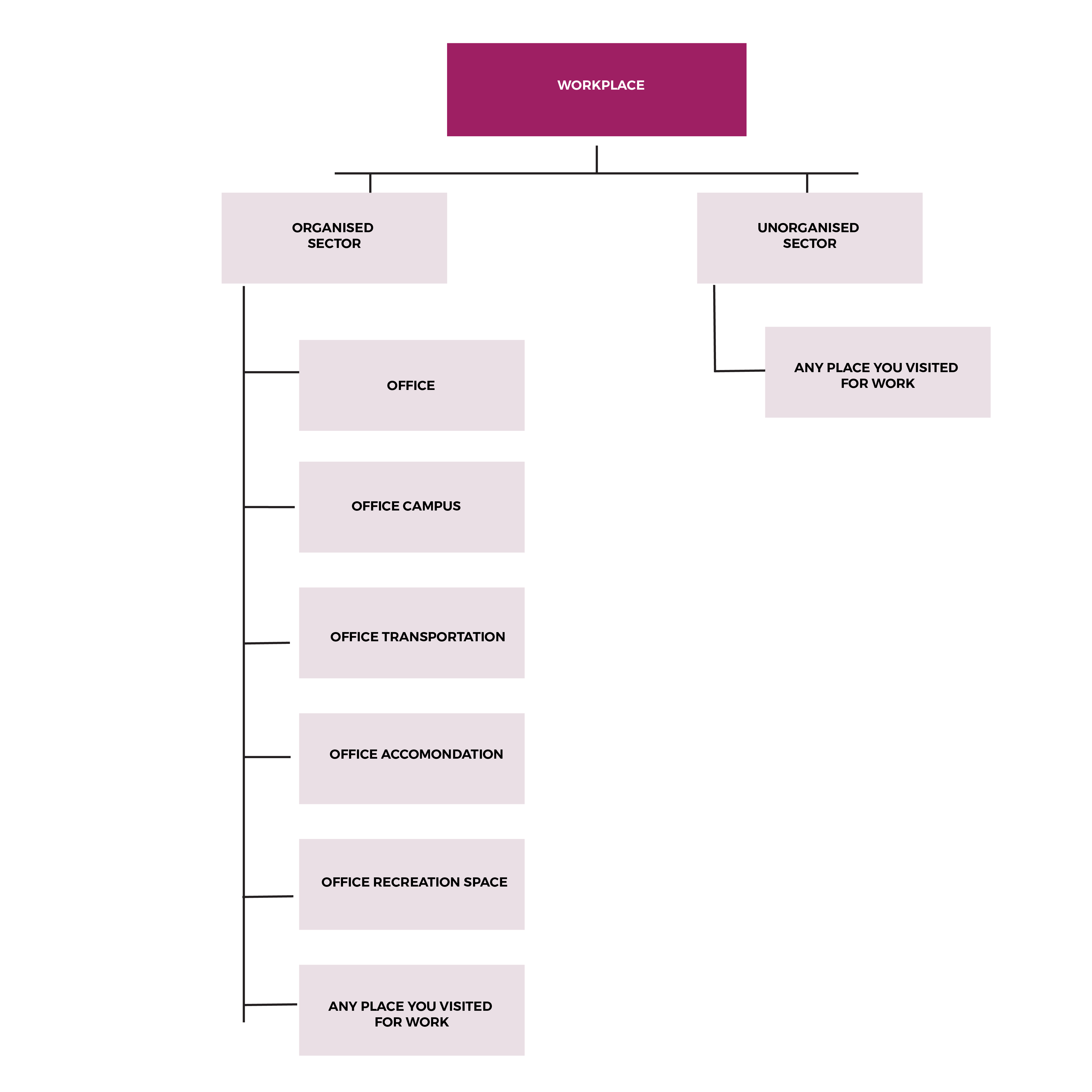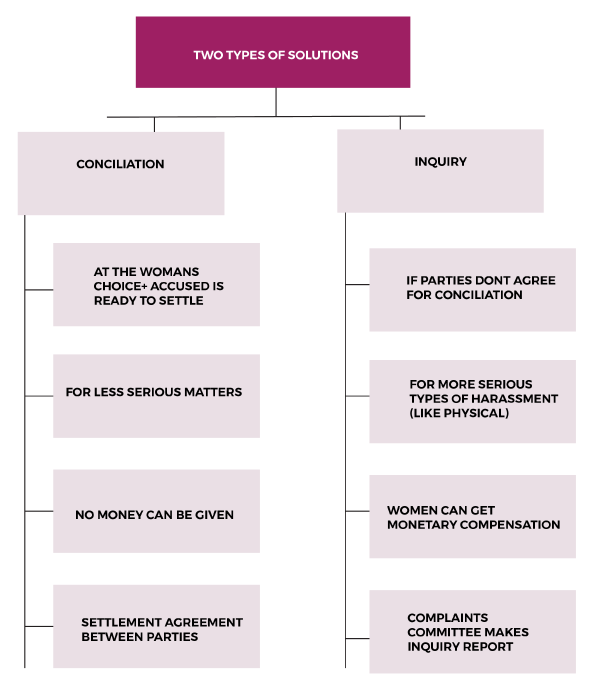Yes, there is a law for sexual harassment at workplace in India. The law is called the Sexual Harassment of Women at Workplace (Prevention, Prohibition And Redressal) Act, 2013, in short, the POSH Act.
In 1997, the Supreme Court of India passed a landmark judgment in the case of Vishaka v. State of Rajasthan. In this case, the Supreme Court urged the Parliament to pass a law on sexual harassment at the workplace. Till the law was passed, the Supreme Court issued guidelines against sexual harassment of women at the workplace (popularly called, Vishakha Guidelines ). Finally, in 2013, the Parliament passed the POSH Act, which is based largely on the Vishakha Guidelines.
The definition of sexual harassment under the POSH Act is almost the same as sexual harassment in general (see Sexual Harassment ). It means any kind of:
The definition of sexual harassment under the POSH Act is very broad and open and includes all kinds of sexual harassments. For further examples of sexual harassment at the workplace, see "What You Should Know About Sexual Harassment".
Practical tip: If you ever feel confused as to whether a specific action is sexual harassment or not, it most probably is. You must trust your instinct. Ask yourself, "Did this particular act make me feel uncomfortable?" If the answer is yes, then you know that it is sexual harassment. Remember, you don’t feel uncomfortable 24x7 and you don’t feel uncomfortable with all men.
A workplace has a very wide definition under the POSH Act (Section 2(o), POSH Act).
For the organized sector, workplace will mean:
For the unorganized sector, since there is no clear-cut office space, a workplace will mean any place where they carry out work. For example:

Practical tip: How to identify your workplace. Ask yourself if you go to this place for work. For example:
Every “aggrieved woman” is protected under this Act (Section 2(a), POSH Act). An “aggrieved woman” is any woman who is:

No, the harasser can be any male in the workplace. The POSH Act does not say anything about whether the harasser should be an employee. The place where the harassment takes place is important (i.e. it has to be the workplace). The harasser could also be someone who is just visiting the workplace.
Under the POSH Act, the procedure given is (Section 9, POSH Act):
Apart from the above, your workplace may have its own procedure (usually corporate and IT companies have their own Sexual Harassment Policy). Please check with the admin or HR department if there is a procedure.
Remember: Apart from filing under the POSH Act, you can also file a regular police complaint about sexual harassment under criminal law
Organised Sector: If your workplace has an Internal Complaints Committee (explained below), then with the committee. If it does not have one, then with the Local Complaints Committee(explained below).
Unorganised Sector: With the Local Complaints Committee, as unorganized sectors do not usually have an Internal Complaints Committee.
The POSH Act requires that every workplace with more than 10 employees (of any gender) must compulsorily constitute a committee to resolve cases of sexual harassment in the workplace. This is known as the internal Complaints Committee. If there are several branches or sub-divisional branches, the committee must be constituted at all the branches, if the branch has more than 10 employees. (Section 4, POSH Act)
The Internal Complaints Committee shall be nominated by the employer and consists of the following members (Section 4, POSH Act):
Under the POSH Act, the Government has to set up a Local Complaints Committee in every district, for sexual harassment at workplace complaints where:
As per the Act, the employer is obligated to display the order constituting ICC at any conspicuous place in the workplace. However, if this is not done, then one can contact the employer/head of the department/human resource department to obtain information about the ICC.
For locating LCC or one of its members, you can do any of the following:
Yes, a woman if she chooses to do so may both file the FIR with the police and complaint with the Complaints Committee simultaneously.
On filing the complaint, the woman is given a choice of dealing with the issue through either conciliation or inquiry. Conciliation is the mode of solving the matter through an informal method. An inquiry is a formal method of solving the matter. Both methods are guided by the complaints committee.

Resolving Through Conciliation (Section 10, POSH ACT):
Remember: The offender cannot give any monetary compensation to the aggrieved woman for settlement. This provision is to discourage the belief that it is okay to harass as long as you can pay her and get done with it.
Formal Inquiry (Section 11, POSH Act):
If the parties are not willing to resolve the issue through conciliation, then the complaints committee will conduct a formal inquiry.Confidentiality- The entire proceedings of sexual harassment (whether through conciliation or formal inquiry), all details about the complainant, accused, settlement agreement/inquiry reports, etc. have to be kept confidential (by the complaint, accused, and the complaints committee).
Unlike criminallaw , the POSH Act does not prescribe any fixed punishments for the harasser. If the complaints committee concludes that your harasser is guilty, then the committee itself will decide what action is to be taken. If your workplace has an anti-sexual harassment policy, your Internal Complaints Committee will follow it.
The complaints committee can prescribe any of the following punishments/reliefs (Section 13, POSH Act):
The amount of compensation is decided based on the following factors (Section 15, POSH Act):
If, after the inquiry, the complaints committee finds the harasser not guilty, it should give its reasons for the decision in the inquiry report. If found not guilty, no action will be taken against the accused.
What you can do: You can appeal against the committee’s findings. You have to file the appeal within 90 days of the findings, in the Metropolitan Magistrate or Judicial Magistrate (First Class) which has jurisdiction over the workplace. (Sections 18(2) and 27, POSH Act)
If any complaint under POSH Act is made dishonestly, or if the complainant submits any forged documents, it is considered a false complaint. In such a case, the complaints committee will recommend to the employer what action should be taken against the woman.
Remember: Your harasser will always try to use this argument as a defence or counter-attack. Until and unless you have filed a false complaint, you don’t need to worry. Mere failure to prove your case or provide sufficient evidence does not mean that your complaint is false or malicious.
If your workplace has more than 10 employees (of any gender), it has to establish an Internal Complaints Committee. If it has not done so, you can file a complaint with the Metropolitan Magistrate or Magistrate(First Class) against the employer. The court can fine the employer up to Rs.50,000, for a first-time offence. If the employer still does not establish the committee, the court can fine up to Rs.1 lakh and also cancel/suspend its registration.
You can file a complaint against the employer with the Metropolitan Magistrate or Magistrate(First Class). The court can fine the employer up to Rs.50,000. If the employer still fails to take action, the court can fine up to Rs.1 lakh and also cancel/suspend its registration.
The POSH Act puts certain duties on the employer. Some of these are:
Please note: This information has been made available to you for your benefit on an ‘as is’ basis, and is only for your information. It does not constitute legal advice and cannot substitute professional legal advice. Our disclaimer policy can be viewed here ( disclaimer policy)
